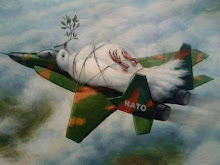By Diana Johnstone
Once upon a time, there was a very
bright little boy in Australia who grew up as stranger to conventional society.
His mother went from husband to husband, from theater to cult, always on the eccentric
margins, while the boy’s natural father was left behind. As an adolescent he found his own world in
cyberspace, which offered a field for his insatiable curiosity. As he learned about that great world out
there and its secrets, he developed his very own rigorous ethic: his vocation
was to search for true facts and share them with the public. Living outside the usual social codes, his
moral compass was uninhibited by the usual niceties. Truth was truth, deception was wrong, lies on
the part of the powerful should be exposed.
The original sin of Julian Assange
was the same as that of Galileo Galilei.
Galileo sinned by revealing to the people things the elite already knew
or at least surmised, but wished to keep secret from the masses, in order not
to shake the people’s faith in the official truth. Assange did the same thing with the formation
of Wikileaks. The official version of
reality was challenged. All lies should
be exposed. By far the most sensitive targets of his wide-ranging reality
revelations were the lies, the hypocrisy, the inhuman brutality of the United
States in its wars of global hegemony.
To Assange, these things were simply wrong.
At first, Wikileaks attracted a
great deal of popular attention and even acclaim. Julian Assange became famous. He was a geek, but he didn’t look like a
geek. Tall, handsome, striking with his nearly white hair, Julian was something
strange: a charismatic geek.
He arrived in Sweden with near
superstar status. Swedish women contrived
to get him into their beds. They bragged
about having sex with Julian: he was a trophy lover. But the charismatic geek didn’t know the
social codes of the peculiar Swedish forms of virtuous promiscuity. This lacuna
was exploited by his enemies in extravagantly unpredictable ways.
Julian Assange tried to straighten
out what seemed to be a serious misunderstanding before leaving Sweden. But the Swedish side failed to make matters
clear and he left for London.
In London, he was quickly taken up
by the radical chic branch of the British upper class, the champagne and caviar
humanitarians. The naïve charismatic
geek who didn’t know the social codes no doubt thought he was among friends. He
didn’t belong to any political or social movement in the UK, he depended on the
beautiful people who for a time found him an interesting outsider, one of their
latest causes.
Julian Assange may have been
socially naïve, but he very acutely perceived what the imperial powers were
working up against him. The totally unjustifiable
demand for extradition to Sweden for questioning – unjustifiable because they
had declined to question him while he was there and then declined to question
him in the UK – appeared to Julian to be an obvious device to enable Sweden to
extradite him to the United States, given the total obedience of post-Olof
Palme Sweden to the wishes of Washington.
Others didn’t see this so clearly, except for the excellent President of
Ecuador at the time, Rafael Correa.
Correa offered Assange asylum in the tiny Ecuadorian embassy in
London. Assange, unconventional,
negligent of the codes, but with a clear view of the danger stalking him,
jumped the bail set up for him and moved into the embassy.
This was the beginning of his
alienation from the caviar humanitarians.
At first the smart set defended him.
Such glamorous personalities as Jemima Khan and Amal Amamuddin (not yet
Clooney) initially defended him and then lost interest. He was not of their world. He did not know how to compromise, he was a
geek after all, less and less charismatic as he faded in the shadows of the
embassy of Ecuador. It’s all very well
to denounce lies and tell the truth, but one mustn’t overdo it. It’s delightful to have a cause when you have
a solid social and financial background to fall back on, and when you know how
to play the game so as to be in and out at the same time. Julian had none of
those social graces. He was honest,
intent, stubborn. He was incapable of hypocrisy, even in his own interest. He would not abjure, as Galileo did.
Such stubborn honesty on the part of
someone who has nothing – no family, no fortune, no social status, no political
party, nothing but his stubborn devotion to truth – is unbearable in a society
based on lies. The media who profited from
his scoops became the most zealous in denouncing him. No wonder: his honesty was a living reproach
to the scribblers who had sold out all down the line, who get ahead by adding
new touches to the mendacious “common narrative” required by the masters of
their careers.
Lies were spread. Someone so honest must have hidden
vices. He must be as bad as we are, or
worse. The mob gathers. This man who knows the truth but not the
social codes is an insult to us all, a freak, a monster, who must be destroyed.
The lynch mob is enormous. The
media, politicians, even the judicial authorities. There are no loud shouts for
blood but silent cruelty as the Anglo-American ruling Establishment shamelessly
contrives to halt the last breath of the outsider who dared expose them for
what they are.


























